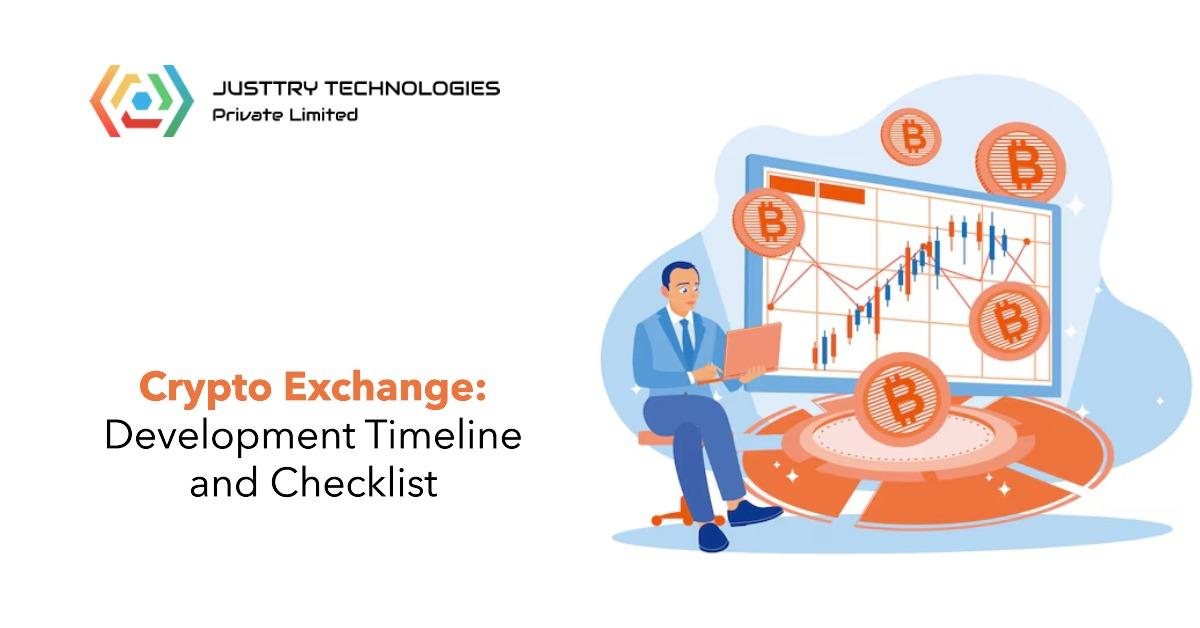How to Launch a Crypto Exchange: Development Timeline and Checklist
Define the Business Model: Choose between centralized or decentralized exchange development depending on your market strategy and compliance flexibility.
Choose the Right Jurisdiction: Regulatory clarity is key; popular crypto-friendly regions include Estonia, Singapore, and Switzerland.
Secure Funding: Allocate resources for licensing, infrastructure, development, and marketing.
Partner with a Cryptocurrency Development Company: Leverage their technical expertise, especially in areas like liquidity integration, trading engine setup, and security implementation.
The process is multifaceted and requires a nuanced understanding of blockchain technology and market mechanics.
The Development Timeline and Checklist
A successful crypto exchange launch hinges on a well-defined timeline and detailed checklist. The following breakdown outlines a pragmatic roadmap:
Planning & Discovery (Week 1–3)
Conduct market research and competitor analysis
Define the target audience and revenue model
Choose between a centralized or a decentralized exchange model
Decide core functionalities (spot trading, futures, margin trading)
Legal & Compliance (Week 4–6)
Register the business and obtain the necessary licenses
Implement KYC/AML protocols
Draft legal policies: privacy, terms of use, disclaimers
Design & Architecture (Week 7–10)
UX/UI design for frontend user experience
Backend architecture planning for performance and security
Wallet management system integration
Development & Integration (Week 11–18)
Core module coding: user management, order matching, admin panel
API integration for third-party services
Integrate multi-currency wallets and trading pairs
Security Implementation (Week 19–20)
Deploy firewalls, encryption layers, and intrusion detection
Implement cold/hot wallet segregation
Conduct smart contract audits for DEX features
Testing & QA (Week 21–23)
Load and performance testing
Bug fixing and system optimization
User acceptance testing (UAT)
Launch & Post-Deployment (Week 24+)
Deploy to the production environment
Onboard users and run promotional campaigns
Set up 24/7 customer support
Schedule regular system upgrades and security audits
Checklist Essentials:
☑ Domain and branding finalized
☑ Regulatory licenses in place
☑ Full-stack development completed
☑ Payment gateway integrated
☑ Security audit passed
☑ Liquidity pool connected
☑ Marketing strategy activated
What makes Justtry Technologies a top choice?
Extensive expertise in cryptocurrency development services
Proven track record in decentralized exchange development
Agile development methodologies and cutting-edge technologies
Focus on compliance, scalability, and user security
Dedicated post-launch support and performance monitoring
As a trusted cryptocurrency exchange development company, they bridge the gap between innovative vision and market-ready execution.
Visit:
https://justtrytech.com/cryptocurrency-exchange-development-company/
Contact us: +91 9500139200
Mail address: sales@justtrytech.com
#Cryptocurrencyexchangedevelopmentcompany #cryptocurrencydevelopmentservices #cryptocurrencyexchangesoftwaredevelopment #digitalassetexchange #Decentralizedexchange #centralizedexchange
How to Launch a Crypto Exchange: Development Timeline and Checklist
Define the Business Model: Choose between centralized or decentralized exchange development depending on your market strategy and compliance flexibility.
Choose the Right Jurisdiction: Regulatory clarity is key; popular crypto-friendly regions include Estonia, Singapore, and Switzerland.
Secure Funding: Allocate resources for licensing, infrastructure, development, and marketing.
Partner with a Cryptocurrency Development Company: Leverage their technical expertise, especially in areas like liquidity integration, trading engine setup, and security implementation.
The process is multifaceted and requires a nuanced understanding of blockchain technology and market mechanics.
The Development Timeline and Checklist
A successful crypto exchange launch hinges on a well-defined timeline and detailed checklist. The following breakdown outlines a pragmatic roadmap:
Planning & Discovery (Week 1–3)
Conduct market research and competitor analysis
Define the target audience and revenue model
Choose between a centralized or a decentralized exchange model
Decide core functionalities (spot trading, futures, margin trading)
Legal & Compliance (Week 4–6)
Register the business and obtain the necessary licenses
Implement KYC/AML protocols
Draft legal policies: privacy, terms of use, disclaimers
Design & Architecture (Week 7–10)
UX/UI design for frontend user experience
Backend architecture planning for performance and security
Wallet management system integration
Development & Integration (Week 11–18)
Core module coding: user management, order matching, admin panel
API integration for third-party services
Integrate multi-currency wallets and trading pairs
Security Implementation (Week 19–20)
Deploy firewalls, encryption layers, and intrusion detection
Implement cold/hot wallet segregation
Conduct smart contract audits for DEX features
Testing & QA (Week 21–23)
Load and performance testing
Bug fixing and system optimization
User acceptance testing (UAT)
Launch & Post-Deployment (Week 24+)
Deploy to the production environment
Onboard users and run promotional campaigns
Set up 24/7 customer support
Schedule regular system upgrades and security audits
Checklist Essentials:
☑ Domain and branding finalized
☑ Regulatory licenses in place
☑ Full-stack development completed
☑ Payment gateway integrated
☑ Security audit passed
☑ Liquidity pool connected
☑ Marketing strategy activated
What makes Justtry Technologies a top choice?
Extensive expertise in cryptocurrency development services
Proven track record in decentralized exchange development
Agile development methodologies and cutting-edge technologies
Focus on compliance, scalability, and user security
Dedicated post-launch support and performance monitoring
As a trusted cryptocurrency exchange development company, they bridge the gap between innovative vision and market-ready execution.
🌐Visit: https://justtrytech.com/cryptocurrency-exchange-development-company/
📞 Contact us: +91 9500139200
📧 Mail address: sales@justtrytech.com
#Cryptocurrencyexchangedevelopmentcompany #cryptocurrencydevelopmentservices #cryptocurrencyexchangesoftwaredevelopment #digitalassetexchange #Decentralizedexchange #centralizedexchange
















